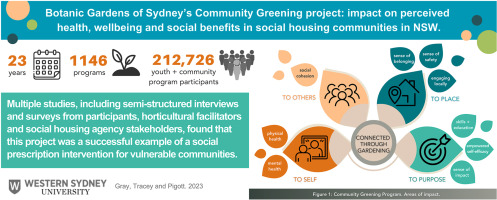New research has revealed how harnessing the power of plants through the Botanic Gardens of Sydney's Community Greening program is improving the health and well-being of vulnerable and at-risk communities.
A new paper published in the Journal of Environmental Psychology has identified community gardening as a successful nature prescription tool to address social disadvantages.
The research examined the impact of the Botanic Gardens of Sydney's Community Greening program across five social housing sites in regional and urbanised areas of New South Wales that are of lower socio-economic status. As part of the study, participants were invited to complete a survey at the beginning of the garden project and approximately six months later.
The education program offered the opportunity for residents of social housing and nearby communities to:
Get to know their neighbours and wider community
Learn gardening skills and how to care for the environment
Increase knowledge about growing and eating healthy food
Build vocational skills, including teamwork, planning and decision making
Improve health and wellbeing through enjoyment of green spaces and growing and eating healthy food
Learn about and value diverse cultures including Indigenous food culture - bush tucker.
Participants reported experiencing a vast improvement in their health and wellbeing, as well as increased feelings of community connectedness through repeated positive interactions, learning experiences, sharing knowledge, interests and labour, increased inter-cultural or own cultural knowledge, and supporting each other in other areas of life.
There was a noticeable reduction in their sense of isolation and loneliness alongside a decline in crime and vandalism.
An increased sense of belonging provided a sense of common identity, prompting cooperation and environmental stewardship, such as respecting others' property and pride in their homes.
From refining their goals in life, or aspirations to study, work, or leisure activities, community gardening gave the resident gardeners a greater sense of purpose or clarity around what they want to do or become.
The paper also found that by having a sense of direction, participants were able to better navigate their way through life's stages and challenges. Participants sensed they were being part of something bigger than themselves, which in turn, amplified the garden's impact.
Resident gardeners described the knowledge and skills they learnt through the educational program as "interesting", "useful" and a major motivator for participation.
These skills included learning how to grow affordable and nourishing food in response to the cost-of-living crisis as well as understanding soil structure, pollinators, plant varieties, worms, mulch, weeding, seed raising, wicking beds, raised beds, composting, urban heat research and climate change.
Botanic Gardens of Sydney Chief Executive, Simon Duffy AM, said the Community Greening has touched countless lives with projects flourishing in areas all over New South Wales.
"I believe in the power of plants. We are part of nature and nature is part of us. We are a community of living things, a complex, beautiful and symbiotic system that connects people, plants and places," he said.
"For over two decades, Community Greening has created a legacy of helping people build practical skills, confidence, and purpose. This research is a reflection of that incredible work happening on the ground."
Phil Pettitt, Community Greening Manager at Botanic Gardens of Sydney, said the power of plants is great medicine.
"I have witnessed first-hand how community gardening can change lives. Our programs have a profound impact on the mental and physical health of those involved through the healing qualities of therapeutic horticulture and connecting people to their communities," he said.
"Our findings highlight the importance of prescribing nature. Through a community of people, plants, and places, Community Greening fosters idea exchange, knowledge sharing, collaboration, empowerment, and celebration of our connection to the natural world."
Community Greening is one of Botanic Gardens of Sydney's most awarded non-profit outreach programs and is co-funded by the NSW Department of Communities and Justice. It empowers vulnerable people and communities to get involved in a community gardening project in their area and provides valuable health, training, education, economic and social benefits to disadvantaged communities across New South Wales.
Since 2000, the Community Greening program has established hundreds of community gardens across New South Wales to positively impact people in cities and remote communities.
About us:
Royal Botanic Garden Sydney | Australian Botanic Garden Mount Annan | Blue Mountains Botanic Garden Mount Tomah | The Domain Sydney
Botanic Gardens of Sydney encompasses three world-leading botanic gardens, Australia's premier botanical research institute, and Sydney's leading outdoor activation precinct. The organisation is founded on a passion for botanical science and horticulture and enriched by its relationship with Traditional Custodians. Botanic Gardens envisages a fair and sustainable world where people, communities and institutions are informed, inspired and motivated to recognise the power of plants and support their conservation.







